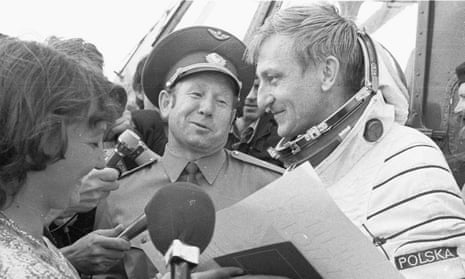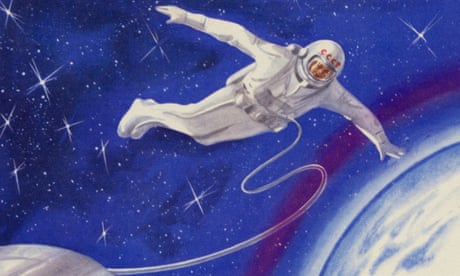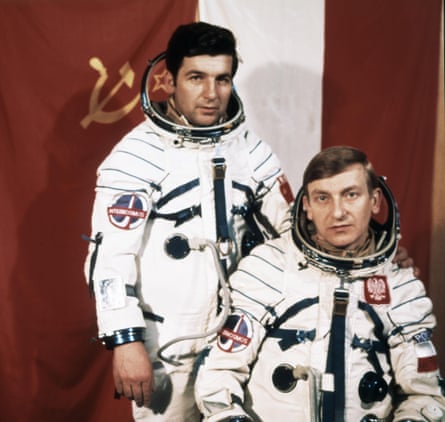Poland’s only cosmonaut, Mirosław Hermaszewski, dies aged 81
Hermaszewski circled Earth in the Soyuz 30 spacecraft in 1978 as part of the Soviet Intercosmos programme

Gen Mirosław Hermaszewski (right) is welcomed after he returned from his space flight in 1978, landing in the Soyuz 30 spacecraft near Arkalyk in Kazakhstan.
Photograph: Tadeusz Zagoździński/PAP/Alamy
AP in Warsaw
AP in Warsaw
Mon 12 Dec 2022

Alexei Leonov, the first man to walk in space
Poland’s only cosmonaut, Gen Mirosław Hermaszewski, who circled the Earth in a Soviet spacecraft in 1978, has died. He was 81.
The retired air force pilot’s death on Monday was announced via Twitter by his son-in-law, European Parliament member Ryszard Czarnecki. He later told Polish media outlets that Hermaszewski died at a hospital in Warsaw of complications from a surgery he had undergone in the morning.
“On behalf of the family, I’m confirming the very sad news about the death of Gen Mirosław Hermaszewski,” Czarnecki tweeted, calling him a “great pilot, good husband and father, and much beloved grandfather”.
Hermaszewski became a national hero thanks to his trip to space. For nine days in June and July 1978, he and Soviet cosmonaut Pyotr Klimuk circled the Earth in the Soyuz 30 spaceship that docked at the Salyut 6 orbital space station. They went around the globe 126 times.

Alexei Leonov, the first man to walk in space
Poland’s only cosmonaut, Gen Mirosław Hermaszewski, who circled the Earth in a Soviet spacecraft in 1978, has died. He was 81.
The retired air force pilot’s death on Monday was announced via Twitter by his son-in-law, European Parliament member Ryszard Czarnecki. He later told Polish media outlets that Hermaszewski died at a hospital in Warsaw of complications from a surgery he had undergone in the morning.
“On behalf of the family, I’m confirming the very sad news about the death of Gen Mirosław Hermaszewski,” Czarnecki tweeted, calling him a “great pilot, good husband and father, and much beloved grandfather”.
Hermaszewski became a national hero thanks to his trip to space. For nine days in June and July 1978, he and Soviet cosmonaut Pyotr Klimuk circled the Earth in the Soyuz 30 spaceship that docked at the Salyut 6 orbital space station. They went around the globe 126 times.

Hermaszewski (right) with Soviet cosmonaut Pyotr Klimuk, with whom he orbited Earth 126 times. Photograph: Sovfoto/Universal Images Group/Shutterstock
In an 2018 interview with the Polish newspaper Rzeczpospolita, Hermaszewski said his biggest fear during the flight was that their spacecraft would be struck by a meteor. His and Klimuk’s senses were sharpened, catching even the smallest sound, he said.
Hermaszewski travelled into space as part of the Soviet Union’s Intercosmos programme, which offered an opportunity to explore space for countries within the then-Eastern bloc under Moscow’s domination or which had ties with the Soviets.
The first person to blast off as part of the programme was Vladimír Remek of then-Czechoslovakia, in March 1978. Hermaszewski followed, while Sigmund Jähn of then-East Germany was the third to fly that year. They had all trained at the Star City space flight preparation facility outside Moscow.
Among other countries that contributed cosmonauts were Hungary, Bulgaria, Cuba, Vietnam, Mongolia, Romania, Syria, Afghanistan and India. France later took part in the programme, sending Jean-Loup Chrétien in 1982.
In an 2018 interview with the Polish newspaper Rzeczpospolita, Hermaszewski said his biggest fear during the flight was that their spacecraft would be struck by a meteor. His and Klimuk’s senses were sharpened, catching even the smallest sound, he said.
Hermaszewski travelled into space as part of the Soviet Union’s Intercosmos programme, which offered an opportunity to explore space for countries within the then-Eastern bloc under Moscow’s domination or which had ties with the Soviets.
The first person to blast off as part of the programme was Vladimír Remek of then-Czechoslovakia, in March 1978. Hermaszewski followed, while Sigmund Jähn of then-East Germany was the third to fly that year. They had all trained at the Star City space flight preparation facility outside Moscow.
Among other countries that contributed cosmonauts were Hungary, Bulgaria, Cuba, Vietnam, Mongolia, Romania, Syria, Afghanistan and India. France later took part in the programme, sending Jean-Loup Chrétien in 1982.
No comments:
Post a Comment